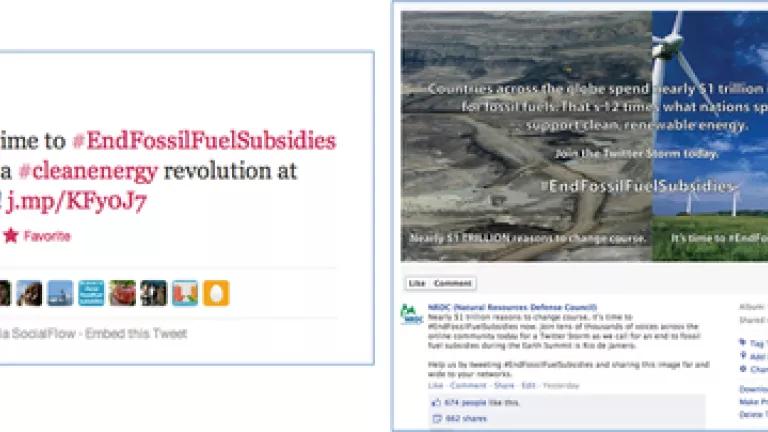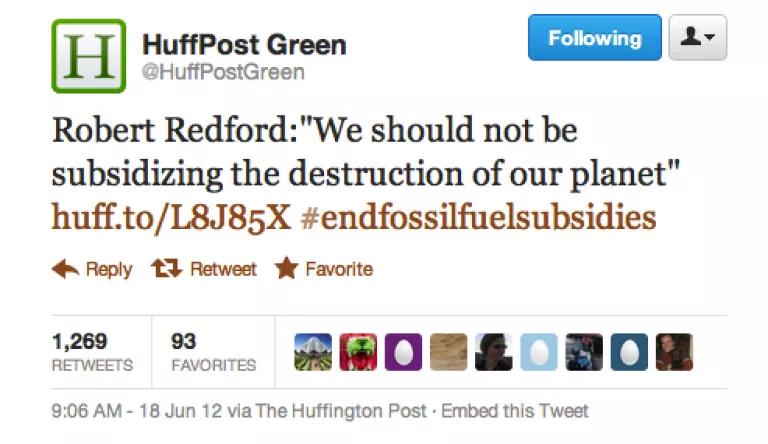Public, Politicians, & Others Rally To End Fossil Fuel Subsidies: Will Governments Listen at Rio+20 and Beyond?

Over the last 24 hours the social media world was abuzz with ending fossil subsidies as a core part of efforts to address global warming. After all, the world is subsidizing fossil fuels 12 times as much as they are subsidizing clean, renewable energy. So, in the last 24 hours more than 100,000 tweets were generated to #EndFossilFuelSubsidies – over 1 tweet per second on average. And they are still rolling in. NRDC, 350.org, Avaaz.org, and many others kicked off this effort yesterday. The final outcome exceeded all our expectations as the need to end fossil fuel subsidies rose quickly to the top of the agenda at Rio+20 and countries received a clear message that it is time to end these subsidies. This “twitter storm” generated so much attention that even politicians, leading thinkers, celebrities, and the media joined in with tweets, blogs, and press coverage. It generated so much attention that an effort by some countries to completely drop it from the final Rio+20 political declaration have failed.
Leading organizations such as 350.org, Avaaz.org, NRDC, and many others launched the effort on twitter and in blogs. And the response was significant, impressive, and awe inspiring. Here is a brief rundown of who joined in and sent this clear message (see below for a full rundown of these actions in pictures and tweets).
Most importantly, over 100,000 citizens throughout the world sent a clear signal—more than one per second (and they are still rolling in). After the launch of the effort, citizens took to Twitter and let their politicians know that it was time to #End Fossil Fuel Subsidies. It was amazing to watch the comments in real time at Rio+20 as countries were negotiating if they would even send a signal that it was time to get off these subsidies. I missed many of tweets throughout the day as it was impossible to keep track of the massive response. But we made sure that the politicians in Rio were aware of the huge surge in public support and they noticed.
Celebrities highlighted the need to end these subsidies. Leading celebrities like Robert Redford (actor and director), Stephen Fry (the English actor), the lolcats, Mark Ruffalo (actor), Reggie Watts (comedian and musician), the foundation supported by Ian Somerhalder (actor), Richard Branson, and others. These tweets reached a huge audience as these celebrities have millions of Twitter followers.

Policymakers noticed and chimed in with a clear signal. Some key politicians noticed the “twitter storm” and chimed in. Supporters included E.U. Commissioner Connie Hedegaard, New Zealand President Helen Clark, a representative of President Obama, U.S. House Minority Leader Nancy Pelosi, U.S. Representative Ed Markey, and others. These politicians clearly get it.
The media noticed and reported on the need to get rid of fossil fuel subsidies. The media took notice of this action and a series of reports that NRDC, Oil Change International, and other groups released on Monday. These key media outlets wrote compelling articles laying out the Twitter campaign, how much money is at stake, and why this is a such a critical issue in addressing global warming. Including the:
- Washington Post: “Environmentalists have rallied around a new, simple goal. As the Earth Summit gets underway in Rio de Janeiro, they’re asking the world’s nations to scrap the $775 billion spent each year subsidizing oil, gas, and coal…as a new report (pdf) from the Natural Resources Defense Council details, global subsidies have nearly tripled since 2009 — from $300 billion to $775 billion.”
- Guardian: “Climate and anti-poverty activists have launched a 24-hour "Twitter storm" against the hundreds of billions of dollars of government subsidies paid each year to the petroleum and coal industry, despite the global economic downturn and the rise in emissions.”
- Nick Kristof of the New York Times: "A twitterstorm underway calling on leaders to #EndFossilFuelSubsidies at Rio summit."
Politicians here in Rio took notice, but now the hard work begins. Some countries were pushing for a clear signal in Rio that it is time for the world to end destructive fossil fuel subsidies. But countries like Saudi Arabia, Venezuela, and India were either trying to water down the commitment to end fossil fuel subsidies or have it completely deleted.
With so much public support and media attention, government officials at Rio+20 couldn’t delete the commitment to end fossil fuel subsidies. So the final agreement that emerged today committed countries to phase-out these fossil fuel subsidies. It isn’t as clear of a commitment as we wanted and our work is clearly not done.
But we’ll leave Rio with the need to end fossil fuels clearly reasserted as a top issue that world leaders need to address in the coming year and a signal that the public strongly supports this effort.
Now let’s get it done!

